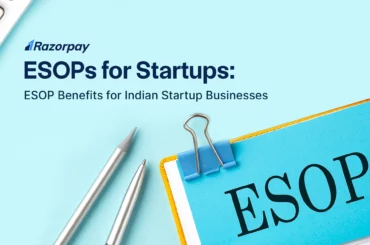Besides helping people stay connected with each other, what do Instagram, WhatsApp, Facebook, Pinterest, Snapchat, Quora, and myriad other such platforms have in common?
You guessed it: they’re great platforms for online ventures, especially when you don’t have deep pockets.
The holy trinity of technological knowhow, hyperconnectivity and entrepreneurial aspirations has given birth to the biggest fear of traditional, brick and mortar businesses: the online venture. Doing business has never been easier.
But, there’s a catch.
Many aspiring entrepreneurs do not know where to start, and there is an equally large number of business owners who don’t really know how to leverage the plethora of options available online, to promote and scale their business.
To those who relate to this, we’d like to say: We hear you.
Whether you’re a business owner who wants to set up shop online, or an entrepreneur looking to start a new venture, here’s a guide to help you start, scale and sustain your business online.
Table of Contents
Starting your online venture
Primarily, starting an online venture could happen in two ways. You could,
- build your business through social media
- create an app or a website to sell your product or service
Social media
If you choose to promote your existing business or start a new business on a social media platform, you would first have to create an account, preferably a business account, on the platform.
Once you have done that, you would need to set up your account, that is, select a profile picture that represents your brand, and add a catchy bio. Then you must start putting up relevant posts that help you grow your followers, increase your reach, and ultimately help you sell more, which is presumably the final goal.
While this is the general process, there are several differences between the various social media platforms in common use. These differences should be understood clearly before choosing a platform to launch and promote your business on, or venturing into social media marketing in general.
You can explore these here: How Social Commerce can help your Business
App or website
Starting an online venture by creating your own website is a slightly longer and more cumbersome (not to mention, expensive) process. You would have to buy a domain name, pay hosting fees, and this whole process may even be quite demanding in terms of technical know-how.
It, therefore, poses a problem to those who may not be very comfortable or familiar with the technical aspects of creating a website.
Worry not! There are ways of setting up a website easily and with minimal costs. There are also platforms like WordPress that have revolutionised the scene with many features that can help you create a fully functional online store in a matter of minutes!
[Suggested reading: How WordPress Plug-Ins can Supercharge Your Business]
One of the things that you should consider while setting up an online venture is how to accept payments.
Even if you do have a website or an app, you need to figure out how to accept payments and go live real quick; otherwise, you may lose potential customers. Moreover, once you do figure out how to accept payments, if your payment portal is not safe enough, does not look professional and is unscrupulous, it would damage your chances of having a successful conversion.
Further, not every mode of accepting payments works for every business model. For instance, subscriptions would require repeated payments periodically.
Clearly, choosing the appropriate mode of accepting payments may prove to be perplexing for anyone setting up an online business. But grieve not! Here’s how you can choose the right payment solution for your business, and accept payments without having to make a website, an app, or writing a single line of code!
Scaling your online venture
Running a home based or small business in a world where the internet is very affordable, and social media is free, means fighting competition. Many small scale businesses leverage this availability of resources and look to tweak things in their favour. Ultimately, like every other business, your venture also needs to scale up. Of course, this is easier said than done.
Scaling up requires some significant changes within the setup, and taking the first step is always difficult. If you are selling products on Facebook marketplace, Instagram, or other portals, then you need fundamental overhauls to the extent of making pathbreaking decisions.
Now that you have pulled up your socks, set up your online venture and are ready to jump headlong into business, let us delve into some teething troubles that you may have as your business grows, and how to tackle them systematically.
#1 Registering your online venture
Many small business owners, freelancers and social media entrepreneurs are often confused about whether or not their business needs to be registered. Various types of organisations function in the business environment, ranging from sole proprietorships to partnership firms to joint stock companies. They are governed by the legal provisions of various acts like The Indian Partnership Act (1932) and The Companies Act (2013).
Therefore, to understand the registration requirements of your venture, you must first understand the different types of business organizations and their registration processes.
While that answers your questions about registering your business, there is another aspect that you need to take into account: GST registration.
GST registration must be done in accordance with the GST law and is different from registering your business as a legal entity under the provisions of various Acts.
FAQs concerning GST registration
Q: Do I need to register under the GST Act?
A: According to the provisions of GST law, businesses whose turnover exceeds Rs 40 lakh* in a financial year are compulsorily required to register under GST. However, the turnover limit is Rs 10 lakh if you have a business in north-eastern states, J&K, Himachal Pradesh, and Uttarakhand.
The threshold is Rs 20 lakh, and in case of special category states, Rs 10 lakh, for the service providers.
You will have to obtain GST registration regardless of the turnover in the following cases:
- Inter-state supply of goods and services
- Supply of goods through an e-commerce portal
- You are a/an
- service provider
- liable to pay tax under the reverse charge mechanism
- casual taxable person
- input service distributor (ISD)
- e-commerce operator
- non-resident taxable person
- TDS/TCS deductor
- online data access or retrieval service provider
Q: When should I register under GST, and where can I apply for registration?
A: You will have to obtain GST registration within 30 days from the date when you became liable to pay tax. But, in case of a casual taxable person or a non-resident taxable person, you will have to register under GST 5 days before the commencement of your business.
You can apply for a GST registration through the GST portal. There is no need to apply physically to any department.
Q: What if I don’t register my business under GST?
A: If you don’t obtain GST registration within the dates prescribed, you will have to pay a penalty of 100% of the tax due or Rs 10,000 whichever is higher.
You can learn more about GST registration, its meaning, and importance for freelancers, homepreneurs and small business owners here.
Having figured out whether or not your organisation needs to get registered and registering your business if applicable, you can now devote your time and energies to growing your business.
To find out how much GST you must pay for your goods or services, simply use an online GST calculator.
#2 Choosing the right tools for your online venture
While scaling up your online venture seems like a daunting task, the good news is that you have help. There are several tools you can use to boost productivity and growth.
These must-have e-commerce tools can help you efficiently manage every vertical of your operations. They can help you with a wide range of functions from Customer Relationship Management to Marketing Automation to Payments and money movement.
#3 Keeping fraudsters at bay
Another aspect of online businesses that you need to understand as you grow is fraud. The most unglamorous thing about running an e-commerce business is the number of fraudsters you have to deal with on a daily basis.
For the longest time, there has been no solution in place for this problem and frauds were often dismissed as a “cost of doing business.” Well, not anymore. Specialised software like Thirdwatch detects fraud orders, impulse purchases and risky orders that signal a cancellation. This will help in reducing overall operational costs in shipping a risky order back and forth and save opportunity costs.
How, you ask?
Thirdwatch runs on an artificial intelligence engine that uses machine learning to profile users. The AI software generates risk reasons across 200+ risk parameters, and takes only 200 milliseconds for generating green or red flags using algorithms like:
- Complete address profiling
- Device fingerprinting
- Diagnosing network effects (detecting fraudsters from across e-commerce portals in India)
- Profiling user behaviour
- Anomaly detection
- Auto order confirmation via OTP/IVR
Sustaining your online venture
Starting the business? Check.
Registration? Check.
Getting familiar with fantastic tools that help you grow your business manifold? Check.
Establishing a great online presence and protection against fraud? Check.
Now comes the part which almost every business struggles with the most: sustaining their online venture. Succeeding once is great, but succeeding consistently is what makes your business truly outshine the competition and leave a lasting impression on people’s minds.
So, what can you do to let your business scale the skies and deliver value to your customers consistently?
#1 Ensure that your finances are sorted
Finance is the life-blood of any business (it’s a cliché, we know). Having good control over your finances and having the right banking partner who ensures all your financial matters are handled smoothly is essential because if your funds are mismanaged, you will run into trouble with respect to paying your bills and managing your working capital.
Besides these, if your money isn’t well-managed and you can’t make sense of your finances, you may end up making not-so-sound financial decisions. As if this wasn’t enough, businesses have to deal with tedious, never-ending processes that involve disbursals and payments.
These processes result in hours and hours of manual efforts due to buggy software, complex infra systems, and many other reasons.
The solution? Neobanking.
What is a neobank?
A neobank is a type of digital bank that does not have any physical branches. Unlike a traditional bank that has a branch at a specific physical location, a neobank is entirely digital and online.
Think of a neobank as a cluster of financial service providers who cater to today’s tech-savvy consumers. Without a license of its own, a neobank leans on bank partners to provide bank licensed services to its customers.
A few benefits of neobanking are:
- Business banking with neobanks helps take your business to any part of the world
- Neo-apps help manage your finances by providing you with an overview of your expenses and a savings goal that matches your needs
- You can save 10x time because of reduced manual effort and instant payouts
- Make, track, control, and analyse all forms of money movement, all from a unified platform
- You can also track and manage money movement to vendors, customers, employees, and more, with the in-depth financial CRM
- Use APIs that are easy to deploy and integrate banking into payments and accounting infrastructure
- Make informed, impactful business decisions with off-the-shelf analysis on payouts mode
Whether your organisation is a small business or a big one, bootstrapped or funded, it’s always good to have your finances under control and run a tight ship. That way, when you have to make that next big pitch or a crucial decision, you will have the right numbers to back you.
#2 Keep an eye on the competition (and yourself too!)
Keep thy friends close and thy enemies closer.
Always have a watchful eye over what your competitors are up to. Not only will it help your business stay relevant, but it will also help you identify gaps in their value delivery system which you could work upon, thus getting more customers for yourself.
Added to that, analysing competitors’ mistakes will help you avoid making them yourself, and scrutinising their product or service might just let you know what you lack. That said, it is equally important to look at your own brand and how it is being talked about by actual and potential customers.
Tools like Brandwatch and Meltwater help you do just that: they track your brand mentions and help to gain insights about the tone and emotion in which your brand is being talked about. This, in turn, helps you channelise your marketing efforts better and turn the conversation about your brand in your favour.
#3 Collaborations are the way to go
No business is an island unto itself. Collaborating with brands, strategic partnerships, and forging the right alliances in business go a long way in ensuring the long-term success of the venture. Not only can it help your brand get a bigger share of the limelight, but it might also open up another source of income for you!
Whether it be a simple shoutout from a friendly influencer or a long-term strategic partnership with your suppliers, your payment solutions provider, your logistics service provider, or your B2B customers, collaborations go a long way in ensuring the sustained success of your business.
Related Read: What is B2B eCommerce, And How Does it Work?
Razorpay Partner Program
The Razorpay Partner Program is designed in such a way that the partners, who build solutions for businesses or consult with them, can use Razorpay’s payment stack to enable more businesses to accept payments online.
This reseller program truly widens the horizon for all kinds of businesses!
What’s more – this affiliate program is not limited to business partners alone, even individual businesses and individuals can use it to earn commissions by referring businesses to Razorpay.
Razorpay partners get commissions for the transactions made by their merchants. A point to be noted for partners involved in referring and managing merchant payment stack – the transactions have to be initiated by the partner for the partner to get a commission. The partners will need to send invoices to Razorpay on the 1st of every month to get their commission.
Moreover, registering for the Razorpay Partner Program is free and takes less than 30 seconds! If anything, we are currently paying out the highest commissions in the market, which incentivizes the partners to connect more and more businesses to Razorpay.
Intrigued yet? We’re sure you are.
You can learn about the Razorpay Partner Program here.
#4 Don’t be afraid to experiment
As an aspiring entrepreneur, you might be inclined to play it safe in the market. However, going by the books and following every last piece of advice given to you by other experienced entrepreneurs, industry experts, or business gurus may not always be in the best interests of your venture.
Their expertise and experience might be quite beneficial when it comes to streamlining your business processes and adopting the best practices of the industry. That said, you must know what advice, and how much of it, you should follow. Take some advice, but do try experimenting with your marketing, your product, and your processes.
Experimenting can yield unique, innovative, and perhaps unprecedented radical strategies that ultimately help your business scale new heights.
#5 Never stop learning
It pays well to stay abreast of all the trends and developments in one’s profession. Whether you are a homepreneur, a social-media entrepreneur, a business owner taking their shop online, or a freelancer, it is important to stay in touch with the developments in your business environment and understand their repercussions for your business.
Platforms like Razorpay Learn offer you access to quality content on how to run your business better by simplifying industry jargon and breaking down economic events so you can do what’s best for your venture.
Don’t worry; it won’t cost you a dime!
Final thoughts
To conclude, daunting as it may seem, setting up an online business might just turn out to be easier than you think. Just ensure that you stay compliant with the law, keep putting the right kind of effort into marketing your venture, and have the right people and partners on board. You are now ready to start, scale, and sustain your online venture!





